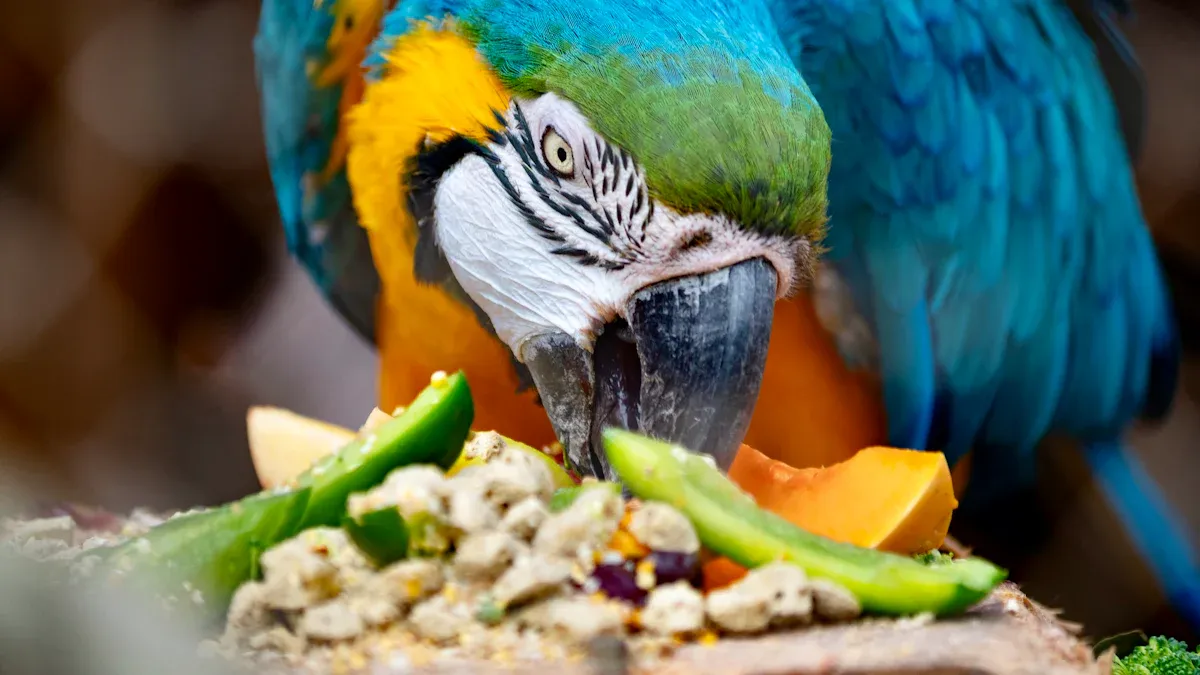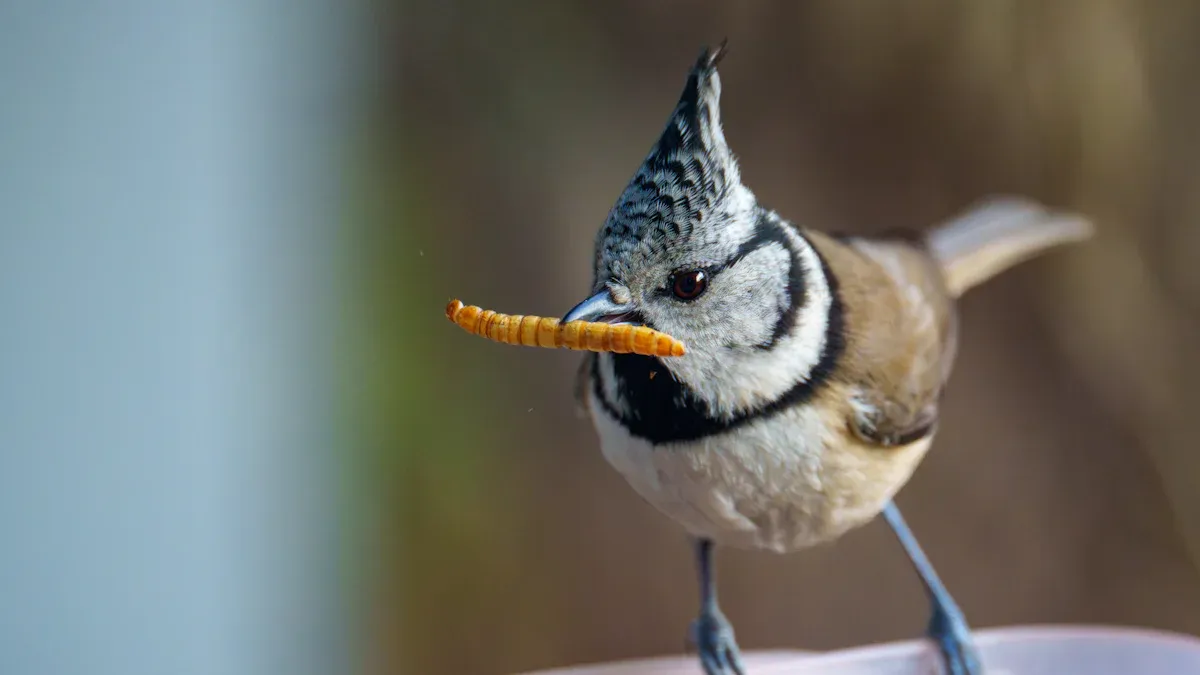
Mealworms Snack for Parrots delivers real benefits. Parrots receive protein, healthy fats, and minerals like calcium and zinc. These nutrients help with feather growth, immune strength, and energy. Many avian nutrition studies show mealworms support vitality. Responsible owners choose this snack to boost their parrot’s health and well-being.
Key Takeaways
- Mealworms provide parrots with high protein, healthy fats, and essential minerals that support feather growth, energy, and immune health.
- Feed mealworms as a treat in moderation, keeping them under 6% of the parrot’s total diet to avoid obesity and maintain balance.
- Choose quality mealworms from trusted sources and store them properly to keep your parrot safe and healthy.
Nutritional Benefits and Risks of Mealworms Snack for Parrots
Protein, Fats, and Fiber Content
Mealworms Snack for Parrots delivers a powerful nutritional punch. Mealworms contain about 16% protein, which supports muscle growth and feather health. This protein level stands out among many parrot snacks. Mealworms also provide healthy fats, which help parrots maintain energy and support brain function. The fat content ranges from 25% to 45%, making mealworms a rich energy source. Fiber in mealworms aids digestion and helps keep the digestive system healthy. Parrots benefit from this combination, especially during molting or periods of high activity.
Vitamins, Minerals, and Essential Nutrients
Mealworms Snack for Parrots offers more than just protein and fat. These snacks supply essential amino acids, B vitamins (like B12 and B2), and minerals such as iron, calcium, magnesium, and zinc. These nutrients play a vital role in bone strength, immune support, and energy metabolism. Compared to other insect-based snacks, mealworms provide higher protein but slightly less calcium than black soldier fly larvae. Crickets have even more protein, but mealworms offer more fat, which is helpful for parrots needing extra energy. The balanced nutritional profile of mealworms makes them a valuable addition to a parrot’s diet.
Tip: Mealworms also contain antioxidants, which help protect cells and support overall health.
How Mealworms Snack for Parrots Fits into a Balanced Diet
Mealworms Snack for Parrots works best as a supplement, not a staple. Parrots need a variety of foods, including fruits, vegetables, seeds, and pellets. Adding mealworms boosts protein and energy, especially during growth or breeding. The table below shows how mealworms compare to other protein sources:
| Aspect | Mealworms | Soybean Meal | Crickets |
|---|---|---|---|
| Protein Content | 45-65% | 44% | Higher than mealworms |
| Fat Content | 25-45% | 0.5% | Lower than mealworms |
| Amino Acids, Minerals, Vitamins | Balanced | Balanced | Balanced |
| Special Notes | High energy, supports growth | Common in poultry diets | High protein, less fat |
Mealworms can replace part of the protein in a parrot’s diet, but experts recommend keeping their share below 6% of total food intake. This approach ensures parrots get the benefits without risking nutritional imbalance.
Potential Risks and Considerations
Parrots enjoy Mealworms Snack for Parrots, but owners must feed them responsibly. Overfeeding can lead to obesity because of the high fat content. Some risks include:
- Obesity if fed in excess
- No specific health disorders linked to mealworms in parrots
- Avoid wild-caught mealworms due to possible bacteria or pesticides
- Choose mealworms raised for pet food to ensure safety
Dried mealworms encourage natural foraging, which keeps parrots active and mentally engaged. Hiding mealworms in toys can boost playfulness and activity. Always monitor your parrot’s health and adjust portions as needed.
Safe Feeding Practices for Mealworms Snack for Parrots

Live vs. Dried Mealworms: Pros and Cons
Parrot owners often choose between live and dried mealworms. Each type offers unique benefits. Live mealworms provide natural movement, which encourages foraging and mental stimulation. They contain more moisture, making them a hydrating snack. Dried mealworms have higher protein and fat content, making them a concentrated energy source. The table below shows the main nutritional differences:
| Mealworm Type | Crude Protein (%) | Crude Fat (%) |
|---|---|---|
| Live | 20 | 13 |
| Dried | 53 | 28 |
Live mealworms require refrigeration and regular feeding. Dried mealworms are easier to store and serve. Both types can be part of a healthy diet when used correctly.
Portion Size and Frequency
Parrots thrive when owners offer Mealworms Snack for Parrots in moderation. Experts recommend limiting mealworms to less than 6% of the total diet. Most parrots do well with 2-4 mealworms, two or three times per week. This approach prevents overfeeding and keeps the diet balanced.
🦜 Tip: Adjust portion size based on your parrot’s size, age, and activity level.
Preparation, Serving, and Storage Tips
Proper handling keeps mealworms fresh and nutritious. Follow these steps for best results:
- Gutload mealworms with nutrient-rich chow and calcium gel before feeding.
- Remove uneaten food after 24 hours to prevent mold.
- Store live mealworms in a refrigerator at 45-50°F.
- Once a week, let mealworms warm up for feeding and hydration.
- Use a shallow, clear plastic or glass container with fine bedding.
- Offer fresh vegetables for moisture.
- Avoid wood or cardboard containers.
These steps help maintain the quality of Mealworms Snack for Parrots.
Sourcing Quality Mealworms
Choose mealworms from trusted suppliers. High-quality mealworms come from controlled environments with safe feed and clean conditions. Look for products that follow strict production standards and avoid contamination. Some mealworms meet food safety regulations for humans, but always check for freshness and proper packaging. Sustainable sourcing also reduces environmental impact, as mealworms use less land and produce fewer greenhouse gases than other protein sources.
Mealworms Snack for Parrots gives parrots a protein-rich boost. Owners should select premium mealworms and serve them as treats. They should watch their parrot’s health and ask an avian vet if needed. A colorful, balanced diet keeps parrots happy and healthy for years.
FAQ
Can all parrot species eat mealworms?
Most parrot species enjoy mealworms. Owners should introduce them slowly. Mealworms Snack for Parrots suits both small and large parrots.
Are dried mealworms better than live mealworms for parrots?
Dried mealworms offer convenience and higher protein. Live mealworms provide hydration and natural foraging. Both types benefit parrots. Owners should choose based on their bird’s needs.
Tip: Try both types to see which your parrot prefers!
How should owners store Mealworms Snack for Parrots?
Store dried mealworms in a cool, dry place. Keep live mealworms refrigerated. Always check for freshness before serving to ensure the best nutrition.


